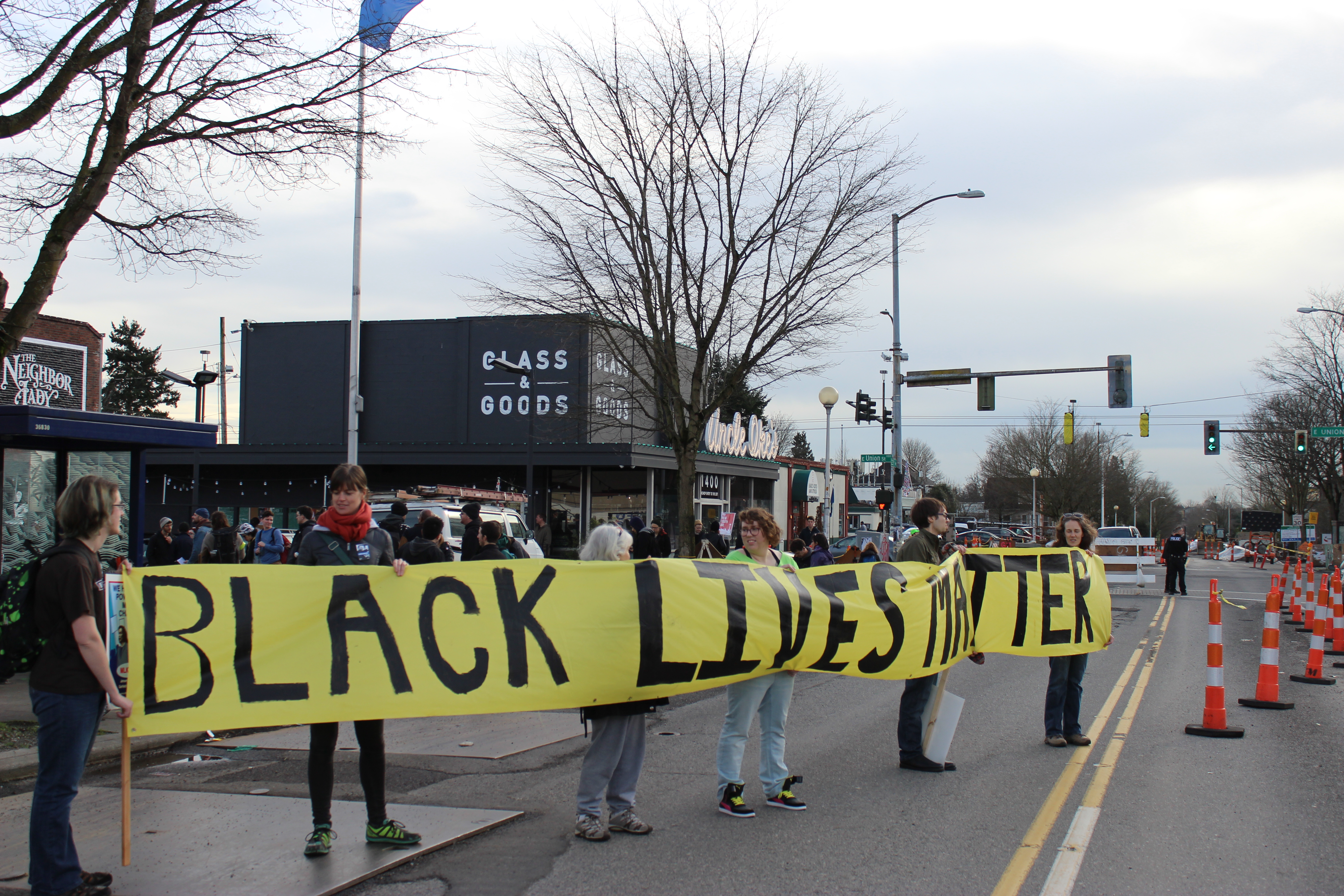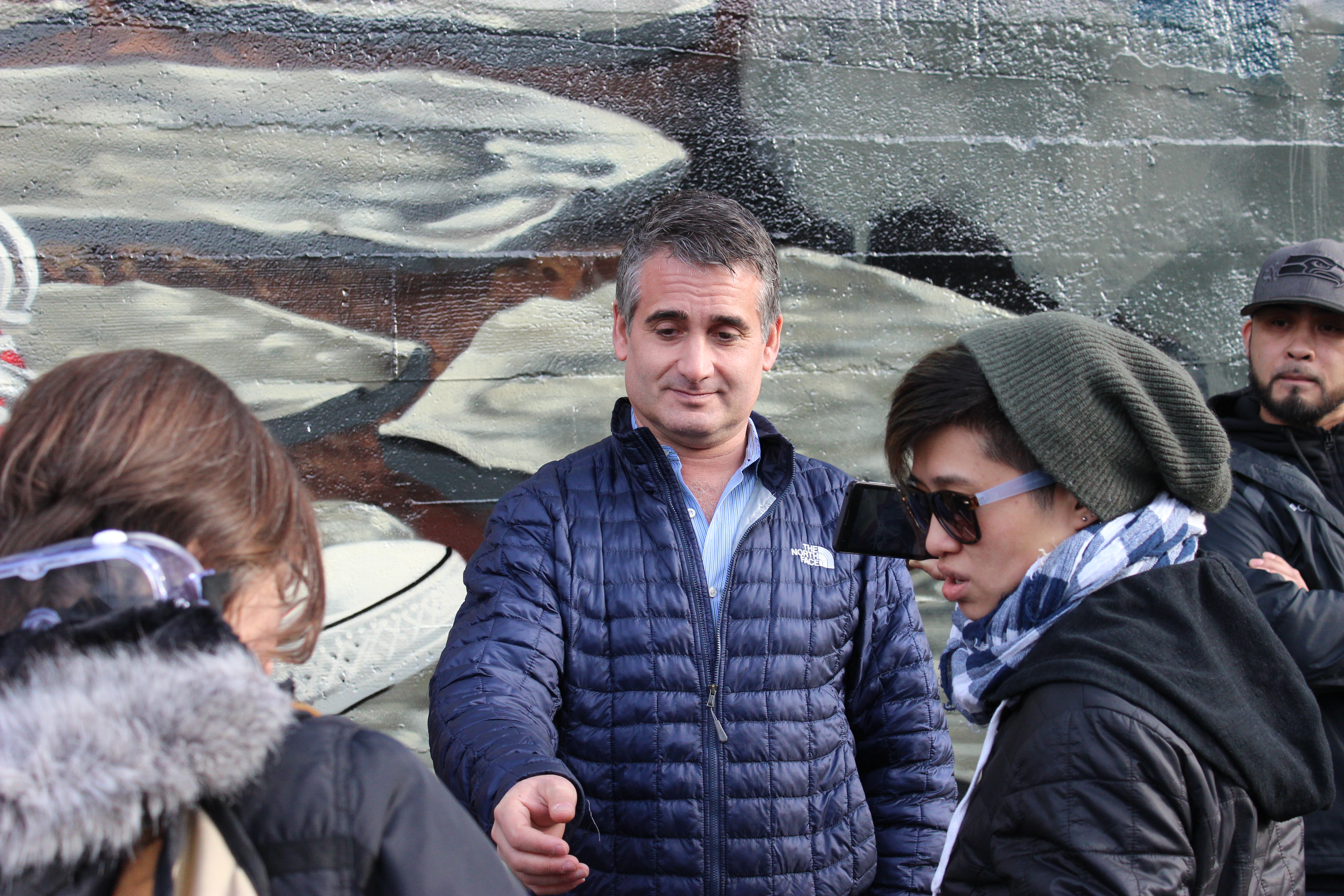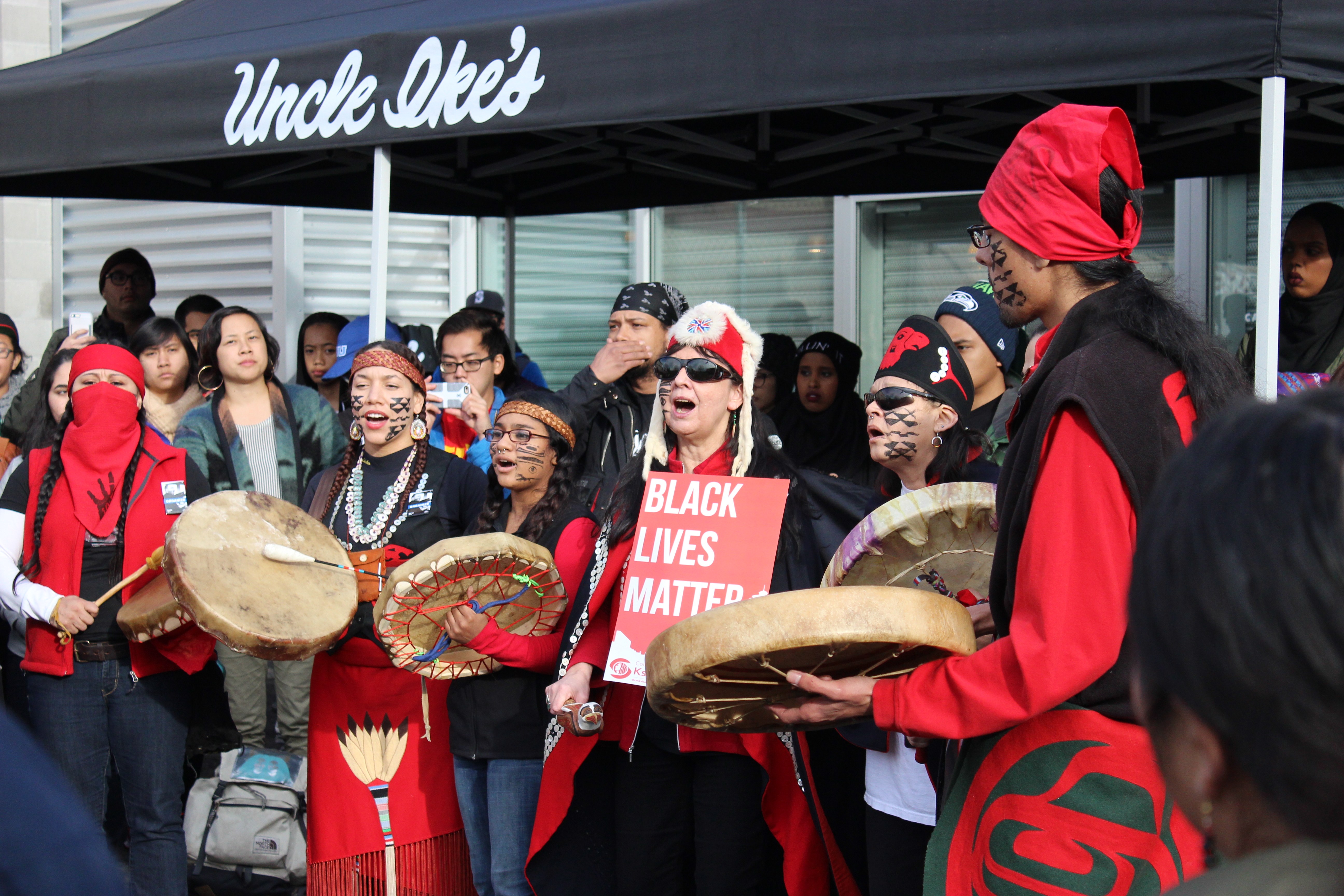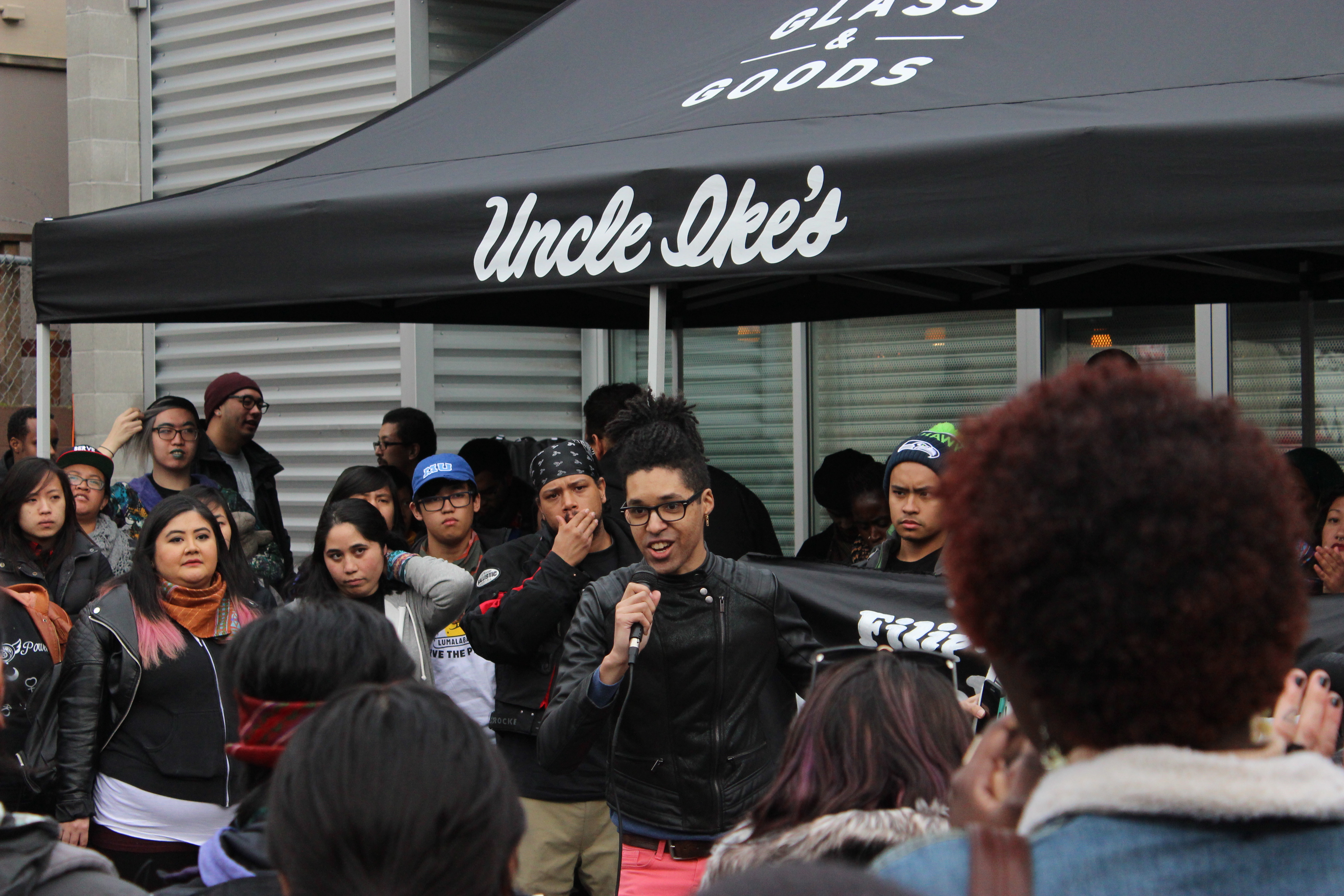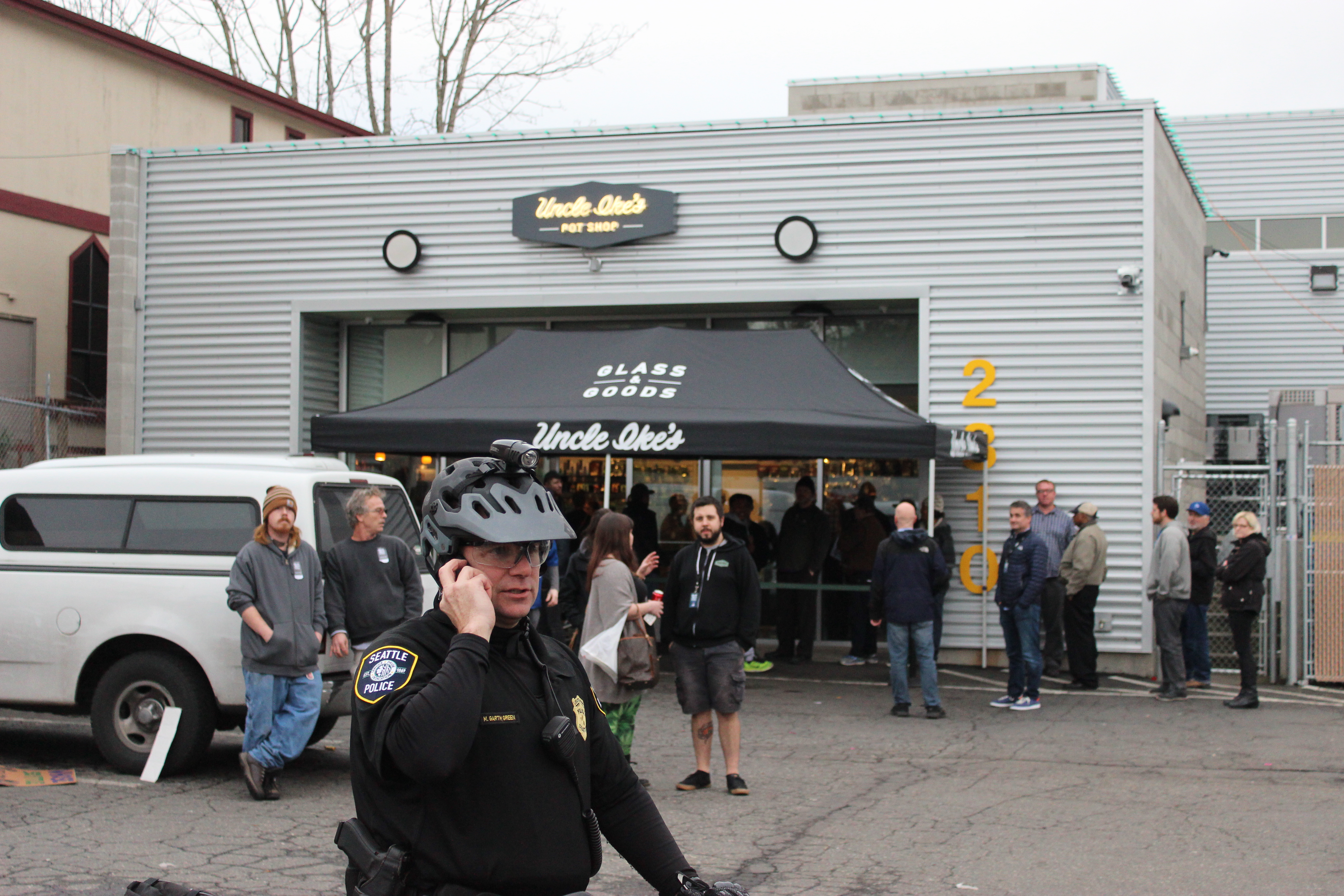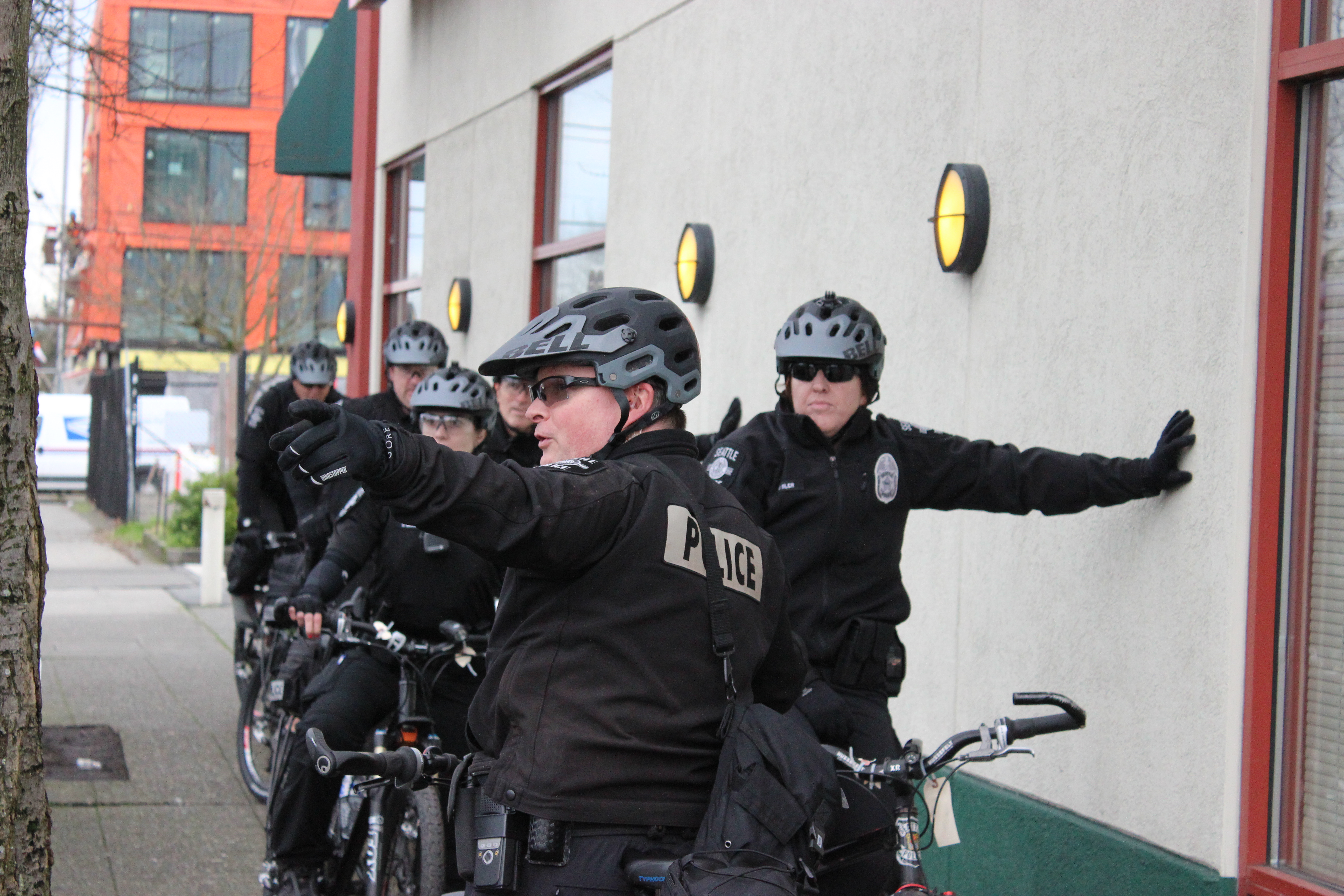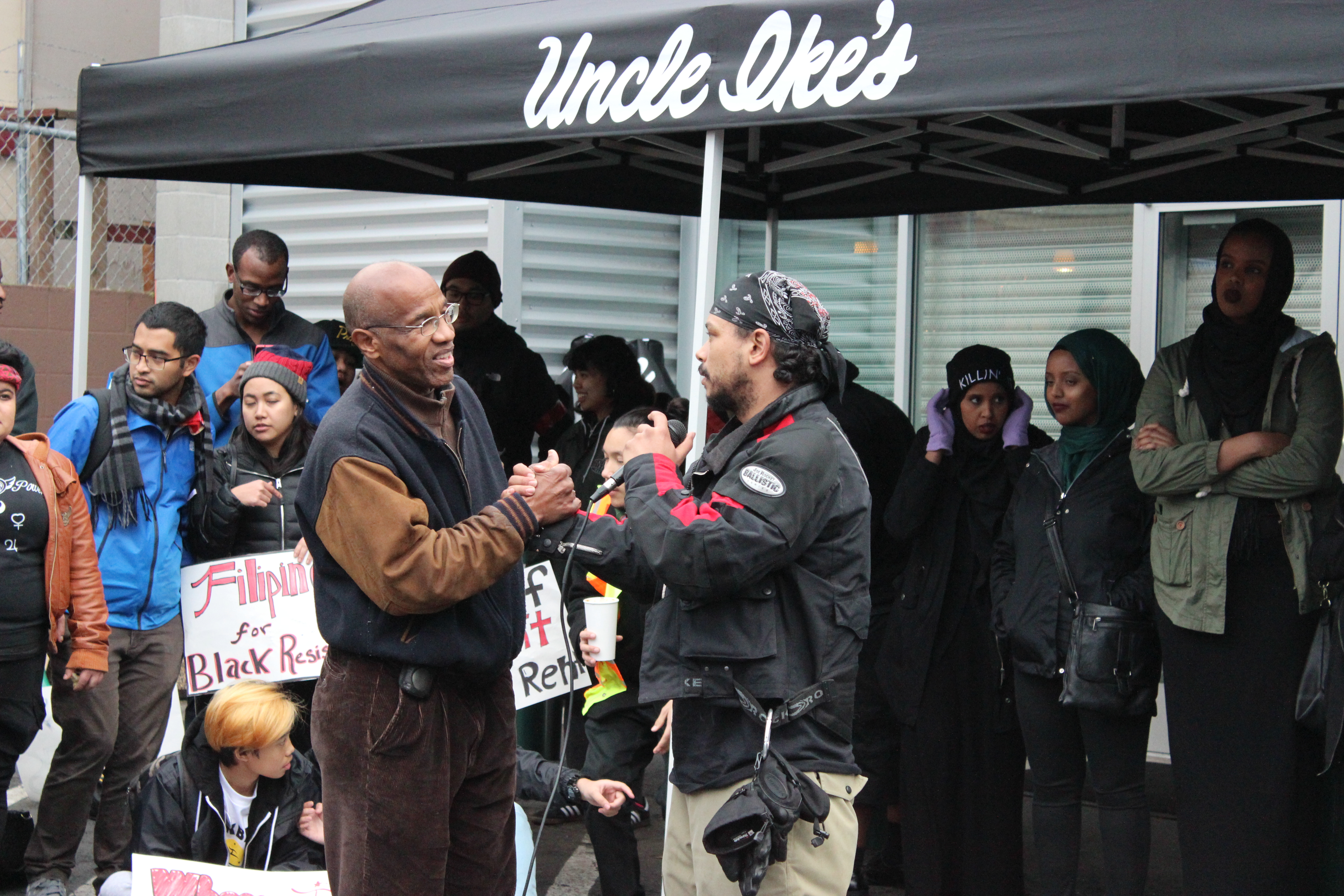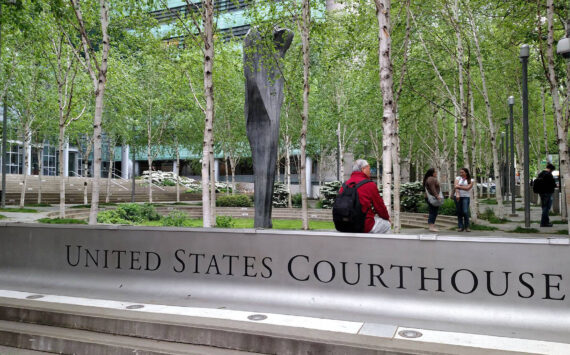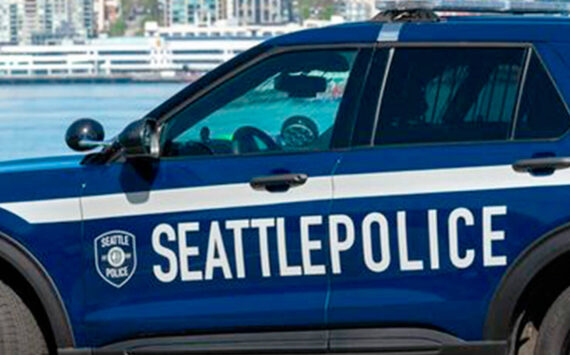Monday afternoon, Uncle Ike’s parking lot was overflowing with people.
But they weren’t customers buying pot. They were black liberationists stirring the pot, and they managed to shut down the Central District’s best-known pot shop for several hours on Martin Luther King, Jr. Day.
Why? Gentrification. Since it opened a year and a half ago, Uncle Ike’s has become to many a symbol of the new money that’s pouring into the CD, Seattle’s historically black neighborhood. The argument goes like this: when a poor, black neighborhood starts to fill up with new, wealthy, white residents and businesses that cater to them, local cost of living rises and longtime residents are gradually forced to move to a more affordable neighborhood.
As CD resident Inye Wokoma told me last year, “You can call it displacement, you can call it an exodus…The community I grew up with no longer exists…People basically dispersed and found places where they could afford to live.
“This issue of forced displacement is a real issue,” he said, regardless of whether “that forced displacement is…a result of [wealthier] folks taking an interest in an area, or more overt mechanisms like housing covenants.”
Yesterday’s protest, organized by the Seattle Black Book Club, was an attempt to push back against the transformation of the CD into another white yuppie enclave. But it also put on display some of complex constituencies that have lined up behind the banner of “Black Lives Matter.” For instance, the indigenous activists who led the crowd in a series of chants wore red and black clothing “to unify ourselves,” according to one speaker, with black liberationists. Nearly half the crowd was comprised by Filipino activists affiliated with Bayan-USA, one of whom called for a “radical redistribution of resources and power.” And Renee Jarreau Greene, a transgender woman, appealed to the crowd to “center” trans and queer black people at the heart of the black liberation movement.
We talked to some of the protesters, as well as Uncle Ike’s owner Ian Eisenberg, who was present during the protest. Here’s what they said.
Bernadette Ellorin–Filipina activist with Bayan USA.
BE: We feel it’s very natural for us to be here. The people of the Central District who are being displaced from their own community–that condition is very familiar to us because we’re colonized peoples as Filipinos. We essentially have also been displaced from our own country, even though there are generations of Filipinos who have been born and raised here, the reality is we migrated because we were forced to because of the same market forces that are gentrifying communities like the Central District. We feel a kinship with the struggle of the Central District residents.
SW: When you say market forces, does that mean an economic phenomenon that comes out of capitalism naturally, rather than a conscious strategy?
Well, capitalism is a very conscious policy of a very elite few. They have consciously constructed a global economic system–global monopoly capitalism or imperialism that really profits from the displacement of peoples, the division of peoples, racism and white supremacy, the criminalization of peoples–these are all very profitable ventures for monopoly capitalists. We feel a kinship here in the Central District because they’re being displaced by the same system that we have been displaced from.
Is the central thesis here that there’s an analogy between the colonization of Filipinos and the gentrification of the Central District?
Yes.
The same thing in two different contexts.
Completely, yes. But the system is the same, just in two different contexts.
Why Uncle Ike’s?
Ian Eisenberg, who owns Uncle Ike’s, is a businessman who is profiting greatly from the displacement of Central District residents, particularly poor, black Central District residents whose community he’s profiting off of. These same poor, predominantly African American residents, prior to Uncle Ike’s being erected, were living in the underbelly of an economic system that forced them to have to sell drugs. And they were criminalized for that.
Now, what is not ironic, what is tragic here, is that now that marijuana has been legalized and people can have licenses to sell, this businessman is essentially taking that same business venture. Now, he’s protected by the law, protected by the state to do so, and completely making, I believe, over $500,000 a day, doing the exact same thing poor black residents were doing just to survive. [Editor’s note: according to CHS, records show that Ike’s has a daily pre-tax revenue of about $14,000.] This is the reality of the capitalists system we live under. Not only displacement but also extracting and squeezing super-profits from the poor, and also criminalizing them, keeping them incarcerated. We live under a system that relies on mass incarceration, militarization of the police, and white supremacy and racism.
What would you like to see Eisenberg and the city do differently?
Ian Eisenberg should leave the Central District. He should respect the demands of the residents here, whose land he is on. He should leave. He’s not welcome here.
And on the city level?
Any city policy in Seattle should really implement policies that respect the sustainable development of the communities. And particularly the poor communities. Poor communities, they know what ‘development’ means. They know that when real estate people say ‘development,’ it’s not the same thing. We have to ask, development for whom and for what? Development means people here have a roof over their heads, they have food on the table, their kids can go to school, they have access to healthcare and education. Development does not mean erecting more condominiums or businesses like Uncle Ike’s. That is not development. It’s actually backwards regression for development.
So the city should drive a harder bargain with developers vis a vis money for poor housing?
Yes. And all that money should go towards sustainable development of the communities that need it the most.
Renee Jarreau Greene–self-identified trans woman who spoke about Marsha P. Johnson, a black trans woman and activist who died under suspicious circumstances in 1992.
RJG [speaking to the crowd]: The police then, as now, are not trying to prosecute people for the murder of black trans women, which is why we have to look after and take care of ourselves. The police would rather arrest and criminalize black trans women.
But we must not only look after ourselves, we must also make sure the rest of the black community is looking for us. Because sometimes we have these black spaces, and they are not always welcoming for black trans folks, for black queer folks, for black trans women. And that’s not some ‘special black homophobia,’ that’s a fucking myth. It ain’t real.
But there is homophobia and transphobia in our community, as in all the communities here. And we need to fight that. We need to make sure when we have black spaces, we center black trans people. We center black trans women. We center black queer people. [Applause]
RJG [speaking with SW]: The main point I was trying to make is the need to center black trans women, black trans people, black queer people in the liberation struggle and not put those intersections aside. Making sure that when we talk about black liberation it includes black trans women, especially black trans people and black queer people.
SW: Is that happening enough right now?
No. There are trans and queer black people who are building community among ourselves, but the larger black community is not always centering our struggles in the way that needs to take place when we are more vulnerable than cisgender, heterosexual people in a lot of ways. [Editor’s note: rates of violence against black trans women are staggering.]
Does the Black Lives Matter movement still have work to do on this?
It has work to do but I find it very promising in some respects. A lot of the leadership driving the Black Lives Matter movement have been by black queer and trans people. So I feel like that’s a very important step, because it shows that we have a place at the table, we are visible, and we will only work more to make sure that we have our place in the black community and our struggle is not forgotten.
Is that an example of what you meant when you talked about ‘centering’ black queer and trans people?
Yes.
Anything else you want to add?
Rest in peace, Marsha P. Johnson.
Ian Eisenberg–owner of Uncle Ike’s.
SW: What’s your reaction to this protest?
IE: It’s fine to lose a day’s worth of business for young people to do their thing. The thing is, I agree with most everything they’re talking about. There’s problems with gentrification and social justice in Seattle and America.
Why do they think they targeted you?
I’m an easy target. I’m in the CD, it’s always easy to put a villainous face behind something. A lot of their facts are just wrong. But it doesn’t seem to be focused on that.
I heard you were given a list of demands and asked to meet with some of these activists?
I’m not sure who they are. I mean, they gave me a little flyer, and it says ‘The Black Book Club.’ I’ll go upstairs and Google them sometime and see if I can find out who they are. But there has to be some sort of organization. I’m not going to talk to 500 people at once.
Do you think this was a good thing?
Obviously it disrupts business, but I don’t have a problem with it. It’s important to them, and it’s probably important to the society.
Do you have any message for Black Lives Matter?
Is that who this was? The last time they were here, it just became a big anti-Semitic protest. I was glad this didn’t go there, especially with Omari [Tahir-Garrett]
giving a speech at the end. I have a problem with him being on my property.
Are you Jewish?
Yeah. The last [time there was a protest at Ike’s, someone said] I’m a member of the [Israeli Defense Force] and I should be kicked out of the neighborhood. [Editor’s note: according to Publicola, Eisenberg has nothing to do with Israel or its military.]
Palca Shibale–Seattle Black Book Club organizer. Pictured above (center, orange shirt) in a Black Lives Matter protest last year.
PS: This is an event that was put on by Seattle Black Book Club. We are a black-centric organizing group fighting institutional racism and police brutality, and now we are fighting gentrification as it pertains to Seattle and the Central District.
We’re specifically targeting Ian Eisenberg, who today got a list of demands from the Seattle Black Book Club of what we expect him to accomplish. Eisenberg is a real estate developer, in a very general sense…who is responsible for a lot of the gentrification and the displacement of black communities and communities of color that has been happening here in Central District…We want to get his attention and we want him to know that we will not accept the gentrification that he’s bringing to our [homes].
For example, Ian Eisenberg is benefiting off businesses and pushing out businesses, especially black and brown businesses, and benefiting from the marijuana industry that black and brown people are still getting arrested for to this day…In a general sense, we do want him to change the way that he’s acting, systemically.
The composition of the Central District has changed very rapidly over the past ten years or so. This used to be a [part of the] city that had, I think, three times as many blacks than whites, and now I think there’s under a 10 percent black population left here. [Editor’s note: according to the Seattle Times, the CD was 73 percent black in 1970, is less than 20 percent black today, and will likely drop below 10 percent black within a decade.]
We’re being pushed into areas where we’re forced to suffer environmental racism–air pollution, noise pollution further down to the airport. We’re being pushed out of industries that white-owned businesses are mostly profiting off of [and] that black people are being arrested for, especially the marijuana industry. We’re being redlined, our schools are being underfunded, our kids are being targeted, black and brown youth especially, and some of the speakers spoke on that here today. So gentrification is a really big issue. It’s not just Seattle based, but it affects black and brown people especially hard. And so that was our target here today.
This is part of a much bigger campaign from the Black Book Club that you’ll be seeing. We’ll continue to fight gentrification and continue to target businesses and industries and people like Ike who bring gentrification to our communities without any accountability. This is just the beginning of something that will be going on and on from the Black Book Club. That’s just a very small portion of what you saw partake here today.
And we know that this is a system run on money. We will rally, we will protest, we will sit in, we will shut business down. We will make people lose money so that they can hear our voices. Black and brown people deserve to be heard, and we will not be pushed out of our businesses, we will not be pushed out of our neighborhoods. We will stand up and resist.
